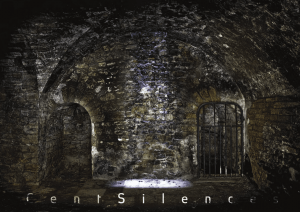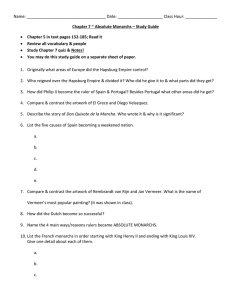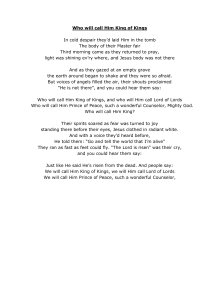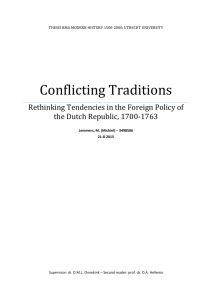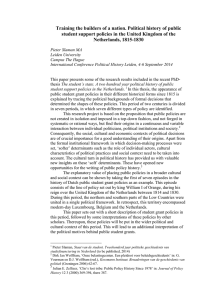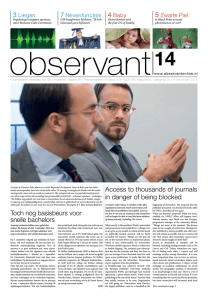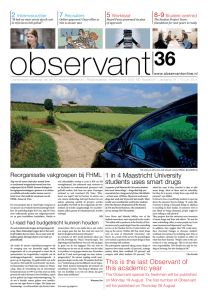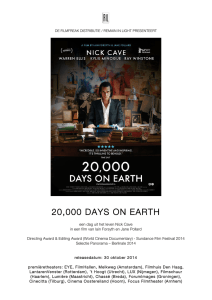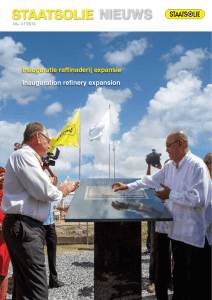aan voor het BRAIN-project : « The Great War from Below. Multip
advertisement
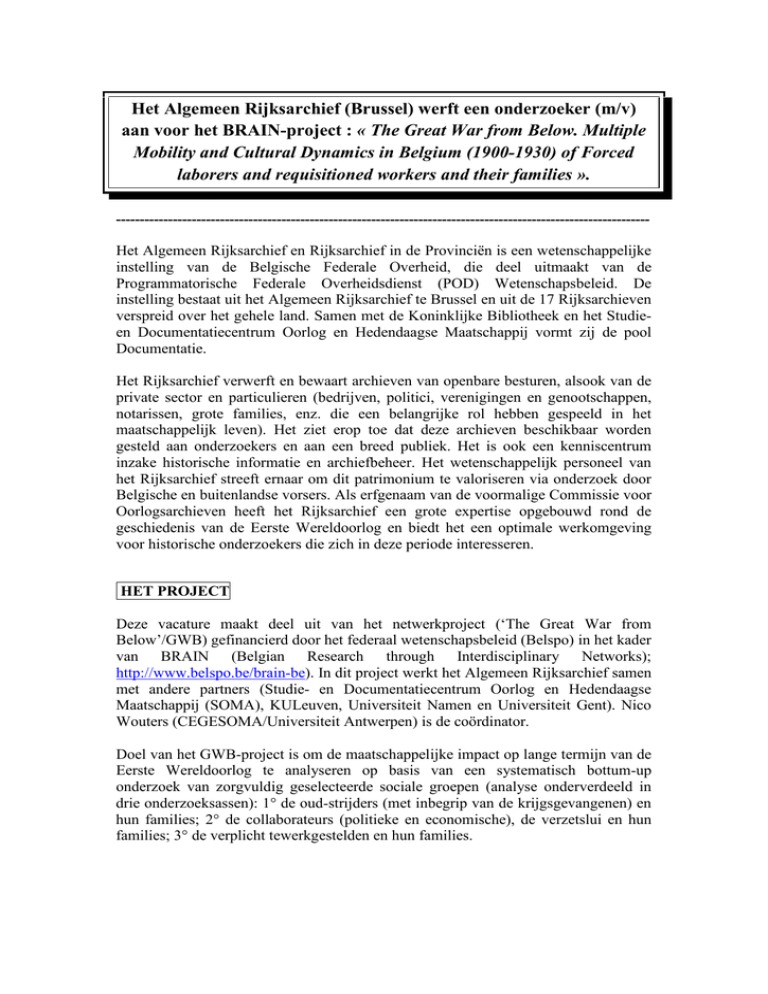
Het Algemeen Rijksarchief (Brussel) werft een onderzoeker (m/v) aan voor het BRAIN-project : « The Great War from Below. Multiple Mobility and Cultural Dynamics in Belgium (1900-1930) of Forced laborers and requisitioned workers and their families ». ----------------------------------------------------------------------------------------------------------------- Het Algemeen Rijksarchief en Rijksarchief in de Provinciën is een wetenschappelijke instelling van de Belgische Federale Overheid, die deel uitmaakt van de Programmatorische Federale Overheidsdienst (POD) Wetenschapsbeleid. De instelling bestaat uit het Algemeen Rijksarchief te Brussel en uit de 17 Rijksarchieven verspreid over het gehele land. Samen met de Koninklijke Bibliotheek en het Studieen Documentatiecentrum Oorlog en Hedendaagse Maatschappij vormt zij de pool Documentatie. Het Rijksarchief verwerft en bewaart archieven van openbare besturen, alsook van de private sector en particulieren (bedrijven, politici, verenigingen en genootschappen, notarissen, grote families, enz. die een belangrijke rol hebben gespeeld in het maatschappelijk leven). Het ziet erop toe dat deze archieven beschikbaar worden gesteld aan onderzoekers en aan een breed publiek. Het is ook een kenniscentrum inzake historische informatie en archiefbeheer. Het wetenschappelijk personeel van het Rijksarchief streeft ernaar om dit patrimonium te valoriseren via onderzoek door Belgische en buitenlandse vorsers. Als erfgenaam van de voormalige Commissie voor Oorlogsarchieven heeft het Rijksarchief een grote expertise opgebouwd rond de geschiedenis van de Eerste Wereldoorlog en biedt het een optimale werkomgeving voor historische onderzoekers die zich in deze periode interesseren. HET PROJECT Deze vacature maakt deel uit van het netwerkproject (‘The Great War from Below’/GWB) gefinancierd door het federaal wetenschapsbeleid (Belspo) in het kader van BRAIN (Belgian Research through Interdisciplinary Networks); http://www.belspo.be/brain-be). In dit project werkt het Algemeen Rijksarchief samen met andere partners (Studie- en Documentatiecentrum Oorlog en Hedendaagse Maatschappij (SOMA), KULeuven, Universiteit Namen en Universiteit Gent). Nico Wouters (CEGESOMA/Universiteit Antwerpen) is de coördinator. Doel van het GWB-project is om de maatschappelijke impact op lange termijn van de Eerste Wereldoorlog te analyseren op basis van een systematisch bottum-up onderzoek van zorgvuldig geselecteerde sociale groepen (analyse onderverdeeld in drie onderzoeksassen): 1° de oud-strijders (met inbegrip van de krijgsgevangenen) en hun families; 2° de collaborateurs (politieke en economische), de verzetslui en hun families; 3° de verplicht tewerkgestelden en hun families. Deze vacature heeft betrekking op de onderzoeker die zal werken bij het Algemeen Rijksarchief rond de sociale groep dwangarbeiders, verplicht tewerkgestelden en weggevoerden (en hun familiale omgeving). FUNCTIEBESCHRIJVING Taken : Hoofdopdracht : * het deelproject over dwangarbeiders (en hun sociaal milieu) in het kader van het globale project GWB afronden binnen 4 jaar; * op het einde van het project een doctoraal proefschrift voorleggen aan een Belgische universiteit of een studie die vatbaar is voor publicatie Tijdens de hele periode van het onderzoek : * in nauwe samenwerking met de coördinator en de verschillende partnerinstellingen van het project werken aan de valorisatie van en de verspreiding van de eigen onderzoeksresultaten (aanwezigheid op de vergaderingen en conferenties van het netwerk, publicaties in wetenschappelijke tijdschriften, actieve deelname aan seminaries en andere bijeenkomsten georganiseerd in het kader van het project GWB); * bijdragen aan de organisatie van een colloquium over de stand van zaken van het bronnenmateriaal en het onderzoek inzake de Eerste Wereldoorlog; * als lid van de wetenschappelijk personeel van het Algemeen Rijksarchief deelnemen aan de kerntaken van de instelling die verband houden met het project (communicatie rond archiefbronnen over de Eerste Wereldoorlog, …) Wij bieden : Een voltijds contract van bepaalde duur van vier jaar vanaf 1 maart 2014 als doctoraatsbursaal of wetenschappelijk attaché. Uw transportkosten met het openbaar vervoer of een fietsvergoeding zullen worden gedragen door de werkgever. Plaats van tewerkstelling : Algemeen Rijksarchief te Brussel, Ruisbroekstraat 2-6, 1000 Brussel. PROFIEL Vereisten : - U bent houder van een diploma van Master Hedendaagse geschiedenis of in de Menswetenschappen dat verband houdt met historisch onderzoek (minstens behaald met onderscheiding); - U heeft een goede actieve kennis van het Frans en het Engels. Passieve kennis van het Duits is een belangrijke troef. Bijkomende vaardigheden : - Goede kennis van de geschiedenis van de twintigste eeuw, vooral van de eerste helft; Masterscriptie en/of (al dan niet gepubliceerde) werken over de geschiedenis van de Eerste Wereldoorlog; Kennis van de doelstellingen en de werking van het Rijksarchief; Uitstekende redactionele vaardigheden Profiel – Vaardigheden : - U heeft zin voor verantwoordelijkheid U bent resultaatsgericht U staat open voor permanente bijscholing in nieuwe vaardigheden en kennis die ook bijdragen tot uw persoonlijke ontwikkeling U bent flexibel U bent communicatievaardig U heeft een goed analytisch vermogen U kan zelfstandig werken maar u functioneert binnen een groep SELECTIEPROEF Het cv (met vermelding van de behaalde graden), een motivatiebrief en een presentatie van één bladzijde over de vraagstelling van het onderzoek, de methode, de bronnen of een specifiek aspect moeten via e-mail aan het Algemeen Rijksarchief gestuurd worden (pers@arch.be) EN per brief vóór 26 januari 2014 (Algemeen Rijksarchief, Ruisbroekstraat 2-10, 1000 Brussel, met als referentie: kandidatuur ‘Great War from Below’). De kandidatuurdossiers mogen worden ingediend in het Nederlands, Engels of Frans. Na selectie op basis van het cv zullen de weerhouden kandidaten worden uitgenodigd voor een interview van 20 minuten door de jury op vrijdag 31 januari 2014. Het interview heeft onder meer betrekking op de inhoud van het cv en verschillende aspecten van het project. Voor alle bijkomende informatie over het project kan u rechtstreeks contact opnemen met Michaël AMARA – e-mail: Michael.Amara@arch.be of met de personeelsdienst van het Algemeen Rijksarchief – e-mail: pers@arch.be The Great War from Below. Multiple Mobility and Cultural Dynamics in Belgium (1900-1930) – general project description This research project aims to analyze the long term societal impact of the First World War (WWI) in Belgium through a systematic bottom-up analysis of carefully selected social groups (in three Work Packages): 1° Veterans (incl. Prisoners of War) and their families 2° Pro-German Collaborators and Resistance Fighters and their families and 3° Forced labourers (deported and non-deported) and their families. A fourth Work Package within the project structure, will not be aimed at a social group as such but serve a transversal methodological goal. The abovementioned social groups were all directly affected by WWI and their particular war experiences initiated processes of group formation and identification to different degrees. Two types of questions are addressed in this research project. 1) How did specific wartime experiences (with a focal point of interest on the confrontation with ‘the other’) influence the longer-term life course of these different groups as a whole (social mobility, changes)? 2) What agency did these groups develop after the war to cope with their wartime experiences; what claims did they make? How broad and fundamental were social changes in contrast with continuities; what types of changes can we detect; to what variables (social, geographical, cultural-religious, wartime experiences/confrontation with the other) can we connect the differences between the analyzed groups with specific war experiences; what caused these changes and how big was the window of opportunity for social change after 1918 (how open/closed did the societal context remain)? To what extent did a shared war past lead to collective claim making and group formation processes? Did these processes result in self-organisations as the creation of numerous associations of war widows, veterans or even former pro-German collaborators clearly indicates? What type of political and social claims did these organisations make, what strategies did they develop and to what extent was their claim making successful? Were some groups (for example veterans) more prone than others (for example forced labourers) to participate in such organisations of people with a shared war past, and if so, why was this the case? To what extent did the social profile of leaders and militants of these organisations coincide with the profile of the social group they presumed to represent? The main methodologies we will use are historical prosopography, social demographic life course analysis and social-political analysis of collective/individual agency. After the major scholarly shift during which cultural histories and memory studies gradually gained dominance in international WWI historiography during the 1990s, this research project wants to contribute to re-introducing social history at the centre stage of WWI historiography. Through what could be considered as a ‘social history of WWI’ we will critically assess the scholarly consensus that assumes that top-down reform related to the principles of massdemocracy instigated by the Great War (political and socio-economic reform) were broadly absorbed and interiorized by local societies and ordinary populaces after 1918. This research is primarily based on crucial archival sources housed by federal scientific institutes that never have been researched systematically before. The project will result in academic books/journal articles and several conferences (one of which specifically about the sources), as well as a popular dissemination for a larger audience based on life stories of specific subgroups. Several interrelated key-questions can be distinguished : 1° A first key question relates to the specific wartime experiences themselves. What happened during the war and occupation to these different social groups; how exactly did war/occupation disrupt lives and what was the specific nature of particular experiences? A focal point will be the confrontation with ‘the other’, starting from the hypothesis that many populaces lived in a ‘closed’ societal context that was overhauled overnight, for the first time confronting significantly large parts of the population with fundamentally other situations/contexts, places and people (for example: the labourers deported to Germany, front-soldiers, women taking on different roles, prisoners of war, confrontation with Russian prisoners of war, with the German occupant, with the anglo-saxon liberator, etc.). This confrontation with the other created both tensions as well as opportunities. We can assume this confrontation opened up social and cultural doors that were hard to close again after 1918. 2° A second key question relates to the longer-term altered life course of these different groups; their multiple mobility (social changes) during the war but also in the decade after the war. Social demography and applied prosopography (see below point 3) will enable us to systematically map the longer term changes to lives of larger populaces, mapping altered life courses through social variables such as marriages and births, upward mobility, geographical mobility, etc. Not only will we map these altered life courses, perhaps on the contrary we will unearth unexpected continuities/stabilities. Such continuities could indicate that existing social differences, for example between social classes, proved to be more influential in the longer run than the impact of specific war expierences. We will also connect these social changes during and after the war to specific variables and wartime experiences themselves. 3° A third key question relates to the concrete agency of these groups in postwar society. These populaces – both as distinct groups and as individuals – adopted a whole repertoire of actions to lay certain claims on society, to defend their interests, to deal with their social situations and roles, to create new identities, to cope with the legacies of war. Using much smaller specific subgroups (see below, methodology) we will analyse more in depth the wide range of activities (collective social actions, political actions, self-organization, memorial activities, reparation claims, individual expressions/actions, etc.) meant to cope with both their wartime experiences as well as postwar claims (material and symbolic). This also implies aspects of self-reflection, in which these groups constructed new individual and collective identities. 4° A fourth and final key question brings the results for the separate social groups together, comparing similarities and contrasts. This will be tackled during the final research stage. Only by integrating the varied experiences of the different social groups can we address the overall underlying research objective of this project on the socially differentiated impact of WWI. ___
